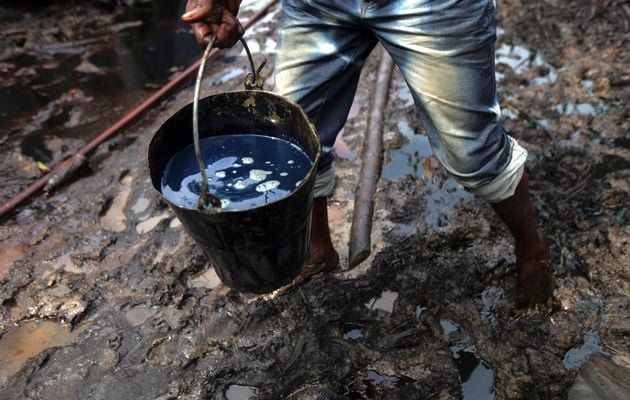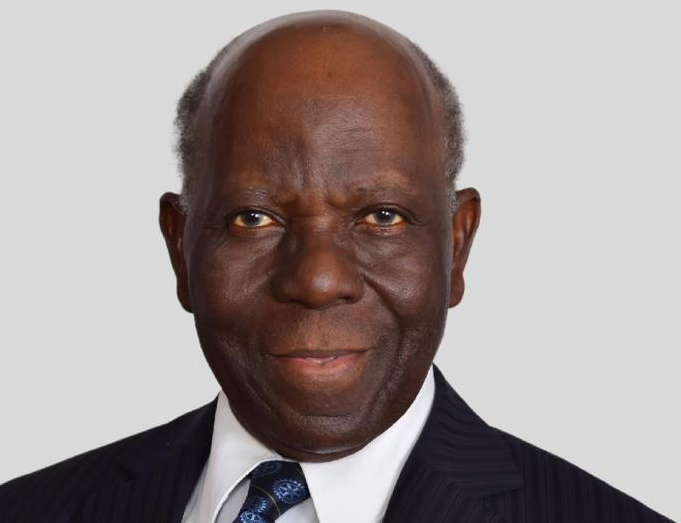BY ISHIOMA APPIAH-YEBOAH AND YECENU SASETU
The Niger Delta, a large area of southern Nigeria and a home to around 30 million people, with core states like Rivers, Bayelsa, Delta, and surrounding states of Akwa Ibom, Cross River, and Edo. Sometimes the states of Abia, Imo, and Ondo are also included in the definition of the Niger Delta region.
The region is known for producing 70% of Nigeria’s government revenue, which is crude oil, petroleum produce, and over the years regular spills of oil, arguably caused by oil theft and sabotage, have polluted the waterways, contaminated crops and other food sources, and released toxic chemicals into the air.
According to Nigerian Extractive Industry Transparency Initiative (NEITI), in its previous audit reports, for 2012, 2013, 2014, and 2015, a total of $9.89bn worth of crude oil was lost due to inadequate measurement/metering of oil produced. As a result of poor oil metering infrastructure, for the same period, up to 106,861,842 million barrels of oil were not adequately accounted for, and this gross leakage and theft continues till this date. This has made the region receive much international attention over the years due to Illegal activity leading to revenue losses as oil is tapped off and stolen.
Advertisement
The menace of oil theft is a cankerworm that seeks urgent solution due to the harm, danger and health hazards it poses on the indigenes in the region. One is left to wonder why someone would steal a commodity that is supposed to benefit everyone? A sense of entitlement? Poverty? Or perhaps anger at the inadequacy or complete lack of dividends? The Nigeria Natural Resource Charter (NNRC) named poverty, unemployment, poor governance, pervasive corruption and the neglect of the Niger Delta region as major reasons for the emergence and sustenance of oil theft over time in Nigeria.
The government says it will work on the environment, but they never fulfil it. If an educated, physically strong man, cannot fish or farm, what else will he do to ensure he has a good livelihood said Mr Alaye Harry, Educator and Businessman who is an indigene and former resident of the Niger Delta.
He, however, added that this may also be due to an attraction to material assets. “as oil bunkering is illegal, it attracts people with negative characters to a locality. Some come with money and arms, lure the young men with flashy lifestyles and in a short time, everyone is jostling to get a piece of the ‘business’.”
Advertisement
As part of its advocacy for a clean Niger Delta, Civil Society Organization, Connected Development, CODE in partnership with OXFAM embarked on community outreach to raise awareness on the risks associated with the lack of adherence to business principles of operations by actors in the value chain of the oil and gas sector while dealing with host communities in the Niger Delta which most times result in conflict and fragility of relationships.
The likes of Obodo Ugwa Ogume of Ndokwa West LGA, Delta State; and Mkpanak and Ibeno villages, Ibeno LGA, Akwa Ibom State were some of the areas visited by the organization. Part of their advocacy was calling on the Anti-Graft agencies, The Attorney-General of the Federation and the Presidency to prosecute Oil & Gas Organizations operating illegally and costing the national environmental and socio-economic damages. CODE also called on citizens to sign a petition(https://www.connecteddevelopment.org/petition/) holding illegal oil thieves accountable and prosecuted for their actions as the inhumane act had caused physical, emotional and psychological challenges in the livelihood of the indigenes.
The findings from the community outreach by CODE and OXFAM showed that there was a communication gap between regulatory MDAs, host communities and oil companies. This then revealed a need for increased multi-stakeholder engagements and improved regulations by the governments using international instruments such as the UNGPBHR and the NAPBHR through a combination of traditional and innovative methods such as town hall meetings, as well as mainstream and social media engagements.
Also, different state and non-state actors, particularly, host communities, oil companies, CSOs and government stakeholders require capacity building on the NAP/UNGP, as well as other international instruments linked to the protection of host communities and the improvement of the operation of oil companies to operate in a transparent, conflict and human rights sensitive manner. Besides, the gaps in the national legal instruments, guiding the operation of oil companies should also be addressed.
Advertisement
In 2016, both government and oil companies indicated that a combined total of N3.8 trillion was recorded as the amount lost from crude oil theft, sabotage and pipeline vandalism. These gas flaring and oil spillage cause environmental degradation and pollution of waterways, the poor governance gives room for limited access to water and a lack of primary health centres.
Mr Harry said the federal government operates the land use act, which states that everything on, under and over the land and territorial waters of Nigeria’s territory belongs to the government, and based on this they say a person(s) taking oil from their land is stealing.
While narrating effects on indigenes, Mr Harry said they are affected through the biological pollution of the environment which leads to the destruction of agricultural produce, Potable water is no longer available and “unexplainable” health conditions thrive.
Mr Harry is not optimistic about the issue ending soon because according to him, “With the existing and obvious dangers involved in this act, you still find young men trying to get into it.”
In May 1971, the Nigerian federal government, then under the control of General Yakubu Gowon, nationalized the oil industry by creating the Nigerian National Oil Corporation via a decree. Following the war with Biafra, the government felt it necessary to secure and gain more control over the oil industry.
Advertisement
Nationalization of the oil sector was also precipitated by Nigeria’s desire to join OPEC, which was encouraging member states to acquire 51% stakes and become increasingly involved in the oil sector. But with this in place, has crude oil improved the economy of Nigeria especially the Niger Delta region or has anybody been prosecuted from oil theft? Oil theft, illegal bunkering, and pipeline vandalism have also resulted in significant loss of the nation‘s revenue, which could have accrued from the sale of crude oil on the international market.
The activities have negatively affected the Niger Delta in terms of environmental pollution, crops contamination as well as sabotage and siphoning off oil revenue. It has also brought about insecurity in the region, such as kidnapping where a huge ransom is demanded before the victims are released and this made the Nigerian government introduce security operatives to remain stationed in the waterways for the arrest of perpetrators of such acts.
Advertisement
The Nigeria Extractive Industries Transparency Initiative (NEITI) in a Policy Brief titled “Stemming the Increasing Cost of Oil Theft to Nigeria” alerted the nation that crude oil and refined products worth $41.9 billion were stolen from Nigeria in the last ten years.
The agency explained that Nigeria loses an average of $11million daily, which translates, to $349 Million in a month and about $4.2Billion annually to crude and product losses arising from stealing, process lapses and pipeline vandalism.
On July 16 2020, the Nigerian Navy convicted and sentenced three men to three years imprisonment each for offences of conspiracy, illegal dealing in petroleum products and unlawful storage of the same products. The three men Ometoruwa David, Morford Meiku and John Innehwere arrested in a vessel, MV Lady Sharon, by the security operatives onboard NNS OSE on Nigerian water.
Advertisement
The Nigerian military, on the other hand, has intensified the fight against crude oil theft, pipeline vandalism and illegal oil bunkering in the Niger Delta region through its operation Delta Safe. The operation has recorded success stories from discovering illegal refining sites at Yellow Platform off Onne, Rivers State, and another illegal refining site along Lokpobiri in Burutu Local Government Area of Delta state was discovered. All these efforts are aimed at sustaining the economy of the country.
Even though Mr Alaye Harry said he had not heard of an individual that was prosecuted for illegal refining, he suggested that to find a lasting solution, Federal Government must come up with a policy that recognizes and regulates bunkers.
Advertisement
“They can then be monitored, given safety guidelines under which they should work and the government can tax them which will lead to an increase in revenue for the country. This will demystify the whole act and reduce the dangers associated with it right now,” he said.
There are opinions that when the Petroleum Industrial Bill is passed, many issues surrounding the oil and sector will be addressed. This Bill will provide checks and balances in the oil and gas sector and aid the implementation of section 8 of the Miscellaneous Offences Act. If oil bunkering is addressed, resources meant for community development, provision of health facilities, schools and water and maternity homes for women can be provided.
1. These are some of the resolutions arrived at during a Tweet chat by CODE and OXFAM: Government and relevant authorities should commit to enforcing the law against Oil Theft and offenders should be punished accordingly.
2. Government and development agencies should democratize access to credit and loans for women and youths to support their economic activities.
3. At the international level, oil theft can be addressed through a sincere multi-stakeholder partnership involving companies, governments, and industry groups.
4. Citizens should demand far-reaching changes to the way the oil and gas industry is managed. The system needs a complete overhaul to address the existing incentives structures that promote corruption, mismanagement and inefficiency.
5. Oil resources and revenues should be redirected to work for the people and the environment protected.
Views expressed by contributors are strictly personal and not of TheCable.
Add a comment






